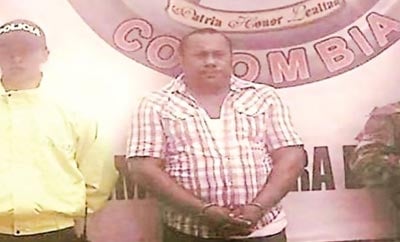Colombia has captured a former paramilitary leader and Gaitanistas head accused of some 130 murders, providing a case study in the overlap between the country’s armed conflict and organized crime.
Colombian authorities announced the arrest of Ruben Dario Avila Martinez, alias “El Calvo” or “Lorenzo,” who has been charged with arranging some 130 murders in the northern province of Cordoba. According to El Tiempo, El Calvo ordered the murders during his time as leader of a 200-strong faction of the paramilitary United Self-Defense Forces of Colombia (AUC) in Cordoba.
Following the AUC’s demobilization in 2006, El Calvo joined the Gaitanistas, also known as the Gulf Clan, Urabeños, and Gaitanist Self-Defense Forces of Colombia (Autodefensas Gaitanistas de Colombia – AGC), and headed the group’s activities in Norte de Santander province, on the Venezuelan border. He is believed to have overseen the group’s show of force in January 2012, when it shut down business and transit in the north of the country for 48 hours in protest over the security forces’ killing of their leader Juan de Dios Usuga, alias “Giovanni.”
InSight Crime Analysis
The case of El Calvo is a good illustration of the intersection between organized crime and Colombia’s decades-long armed conflict. RCN Radio reports that he was a leader of a branch of the AUC’s notorious Catatumbo Bloc, known for committing massacres of suspected guerrilla sympathizers during the early 2000s, and using ovens to dispose of the victims’ bodies. The fact that he later joined the AGC, which was, ironically, headed by two former guerrillas, is an indication of how much political ideologies have given way to illicit profits as an incentive for violence in the country.
El Calvo is part of a generation of fighters who were members of the AUC at the height of its power, and for whom the paramilitary coalition’s demobilization meant little more than a shift in group affiliation. They “demobilized” in name only, or simply stayed in the underworld, and went on to deepen their involvement in the drug trade, but without the veil of political ideology. AUC successor groups like the AGC and the Popular Revolutionary Anti-Terrorist Army of Colombia (ERPAC), collectively referred to by the Colombian government as BACRIMs (“criminal bands”), are now the primary generators of violence in the country.
As Colombia enters negotiations with its largest rebel group, the Revolutionary Armed Forces of Colombia (FARC), the AUC’s failed demobilization and the subsequent rise of the BACRIMs offers a cautionary tale about the dangers of focusing only on the political causes of violence in Colombia. Like the AUC, the strength of the FARC’s military hierarchy has been reduced in recent years, meaning that even if the group demobilizes many members could stay involved in the drug trade.

